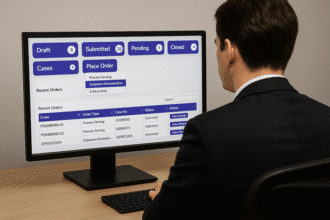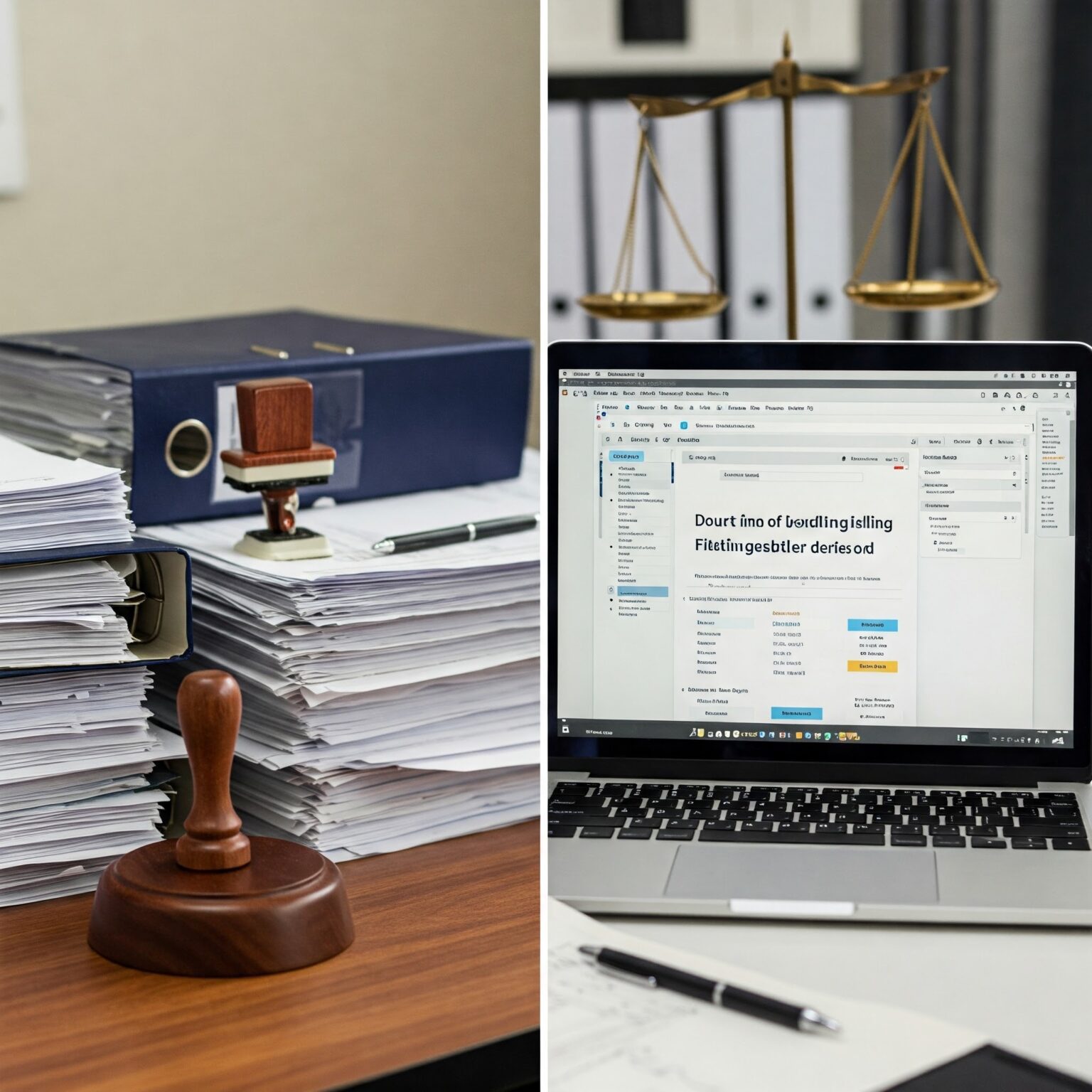If you’ve stepped foot in a California courthouse over the last decade, you’ve probably noticed something big changing—less paper, fewer file carts, and more computers. Welcome to the era of e-filing—a major step toward making the legal system faster, cleaner, and more efficient.
But as with any change, the transition from paper to digital has been a bumpy road for some law firms and solo practitioners. The big question is: Is e-filing better than paper filing? And if so, why are California courts pushing so hard for the switch?
Let’s break it down.
What Is E-Filing, Exactly?
E-filing (short for electronic filing) is the process of submitting legal documents to the court online—no stamps, envelopes, or courthouse lines required. Think of it like online banking for your legal paperwork.
Instead of driving to the courthouse and waiting in line, you or your legal support provider can file pleadings, motions, responses, and more through a secure digital portal. The court receives your documents instantly, timestamps them electronically, and stores them in a digital case file.
Paper Filing: The Old (and Painful) Way
There’s something nostalgic about printing out legal documents, hole-punching them just right, and organizing them in those bulky file folders. But that nostalgia comes at a cost.
With paper filing, you’re dealing with:
- Manual court visits or courier fees
- Rejections due to clerical errors or improper formatting
- Long lines and short court hours
- Delays in processing and case updates
- Tons (literally) of physical storage
Let’s be honest—paper filing is time-consuming and error-prone. It’s a system built for a different era.
Why Are California Courts Going Digital?
California is leading the charge toward paperless courts, and it’s not just about saving trees. The switch to e-filing is about making the legal process faster, more accurate, and more accessible.
Here’s what’s driving the change:
1. Efficiency and Speed
Court clerks no longer have to manually process stacks of documents. With e-filing, the system can automatically timestamp, sort, and route documents to the correct departments. This drastically cuts down on turnaround times.
2. Error Reduction
A study conducted by several courts across the country shows that e-filing has resulted in up to an 80% reduction in clerical errors. That’s a massive improvement when you consider how often rejections happen due to formatting, missing signatures, or other small mistakes.
3. Access and Transparency
E-filed documents are stored digitally, so judges, clerks, and attorneys can access case files from anywhere. No more scrambling to find a missing document or waiting days for records.
4. Environmental Impact
Yes, going paperless also reduces waste. California courts handle thousands of filings daily. Imagine the paper (and toner!) saved when those filings go digital.
E-Filing by the Numbers
To understand the shift, let’s look at a few stats:
- Over 50 California counties now mandate or strongly encourage e-filing.
- Courts with e-filing systems report processing times up to 60% faster.
- Error rejection rates dropped by up to 80% after e-filing implementation.
- More than 80% of civil case documents in high-volume courts are now filed electronically.
The trend is clear: paper filing is on its way out.
So Why Are Some Firms Still Hesitant?
Despite the obvious benefits, some legal professionals are still clutching their filing folders like lifeboats. And to be fair, transitioning to e-filing isn’t as easy as flipping a switch.
Here are some of the most common concerns:
- Technology barriers – Smaller firms or solo practitioners may not have the in-house resources to navigate new platforms.
- Learning curve – Filing platforms can be confusing, especially for those used to the “old way.”
- Fear of errors – Some worry that missing a digital step or uploading the wrong file could result in rejections or sanctions.
- Court-specific requirements – Different counties have different systems, and that inconsistency can be overwhelming.
That’s where support services like Countrywide Process come into play.
How Countrywide Process Bridges the Gap
Countrywide Process has been helping law firms across California file smarter, not harder. Whether you’re a seasoned attorney or a brand-new paralegal, navigating the e-filing landscape can be challenging. But with the right support, it doesn’t have to be.
Here’s how Countrywide helps ease the transition:
1. Full-Service E-Filing
We take care of the entire filing process for you. Just send us your documents, and we’ll handle the rest, ensuring compliance with county-specific rules, proper formatting, and accurate submissions.
2. Quick Turnaround
Because we’ve streamlined the process, most e-filings are completed and confirmed within hours, not days.
3. Error Prevention
We double-check everything before submission. From PDF optimization to signature verification, our experts ensure your filing won’t be rejected for minor technicalities.
4. Personal Support
Got questions? We’ve got real people—yes, actual humans-who—ready to help. Our team is here to walk you through the process or step in when you’re swamped.
5. Hybrid Services
Still need to do a paper filing for a specific court? No problem. We handle both e-filing and physical filing, making us the perfect bridge between old and new.
Real Talk: The Legal Landscape Is Changing
The legal industry has traditionally been slow to adopt new tech. But between court mandates and the undeniable benefits of e-filing, digital is no longer optional—it’s inevitable.
If your firm hasn’t fully embraced the change, you’re not alone. But the longer you wait, the more you risk falling behind.
Here’s what forward-thinking firms are doing:
- Partnering with legal support providers like Countrywide Process
- Training staff on e-filing platforms and processes
- Staying updated on court-specific rules and deadlines
- Automating repetitive tasks (like proof of service or follow-up filings)
Making the leap doesn’t mean doing it all on your own. It means choosing the right partners and tools to future-proof your practice.
The Bottom Line
The shift to e-filing isn’t just a trend—it’s a legal evolution. California courts are investing in digital infrastructure because it improves accuracy, speed, transparency, and access to justice.
Paper filing may still have its place in a few courts or situations, but let’s face it—it’s becoming the exception, not the rule.
So, whether you’re fully on board or just testing the waters, now’s the time to embrace the digital transition. And with Countrywide Process by your side, the shift doesn’t have to be stressful.
You practice law. Let us handle the logistics.
FAQs
Q: Is e-filing mandatory in all California courts?
Not yet, but many counties now require it for civil, probate, and family cases. Always check local court rules.
Q: What if I make a mistake in my e-filing?
Minor mistakes can lead to rejections. That’s why it’s smart to use a professional service like Countrywide Process to reduce risk.
Q: How secure is e-filing?
Very. Court systems use encrypted portals to protect your documents and data.
Q: Can I still use paper filing for criminal cases?
In some countries, yes. Criminal courts often have different procedures. Check with the specific court or ask us for guidance.
Q: Do I need special software to e-file?
Most courts use approved platforms that you can access via a web browser, but navigating them can be tricky. That’s where we come in.
Want to simplify your court filings and avoid rejection headaches?
Reach out to Countrywide Process today. We’ll help you file confidently—paper or digital, anytime, anywhere.






